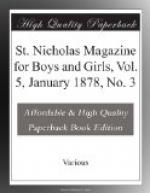p. 30: Missing opening quote replaced: “The snows that glittered on the disc of Mars...”
p. 31:’ replaced with “: “Don’t you think, papa, that that’s enough about the sun? Come and play with us on the lawn.”
p. 59: Missing ) replaced, ...(widening the strip, however, in proportion as the fabric is thinner).
Music Notation (Our Music Page) has been added.]
* * * * *
[Illustration: King Richard II. And his child-queen.]
* * * * *
ST. NICHOLAS.
Vol. V. November, 1877. No. 1.
[Copyright, 1877, by Scribner & Co.]
* * * * *
A CHILD QUEEN.
By Cecilia Cleveland.
I wonder how many of the little girl readers of st. Nicholas are fond of history? If they answer candidly, I do not doubt that a very large proportion will declare that they prefer the charming stories they find in st. Nicholas to the dull pages of history, with its countless battles and murdered sovereigns. But history is not every bit dull, by any means, as you will find if your elder sisters and friends will select portions for you to read that are suitable to your age and interests. Perhaps you are very imaginative, and prefer fairy tales to all others. I am sure, then, that you will like the story I am about to tell you, of a little French princess, who was married and crowned Queen of England when only eight years old, and who became a widow at twelve.
This child-sovereign was born many hundred years ago—in 1387—at the palace of the Louvre in Paris, of whose noble picture-gallery I am sure you all have heard,—if, indeed, many of you have not seen it yourselves. She was the daughter of the poor King Charles VI., whose misfortunes made him insane, and for whose amusement playing-cards were invented, and of his queen, Isabeau of Bavaria, a beautiful but very wicked woman. Little Princess Isabella was the eldest of twelve children. She inherited her mother’s beauty, and was petted by her parents and the entire court of France.
King Richard II. of England, who was a widower about thirty years old, was urged to marry again; and, instead of selecting a wife near his own age, his choice fell upon little Princess Isabella.
“She is much too young,” he was told. “Even in five or six years she will not be old enough to be married.” The king, however, thought this objection too trifling to stand in the way of his marriage, and saying, “The lady’s age is a fault that every day will remedy,” he sent a magnificent embassy to the court of France, headed by the Archbishop of Dublin, and consisting of earls, marshals, knights, and squires of honor uncounted, with attendants to the number of five hundred.




